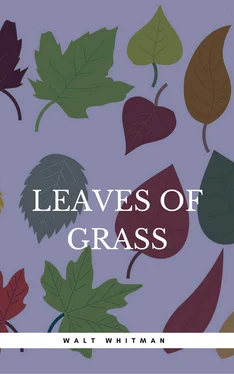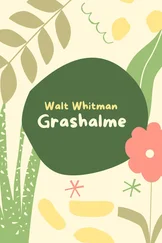Walt Whitman - Leaves of Grass
Здесь есть возможность читать онлайн «Walt Whitman - Leaves of Grass» — ознакомительный отрывок электронной книги совершенно бесплатно, а после прочтения отрывка купить полную версию. В некоторых случаях можно слушать аудио, скачать через торрент в формате fb2 и присутствует краткое содержание. ISBN: , Жанр: Языкознание, Критика, на английском языке. Описание произведения, (предисловие) а так же отзывы посетителей доступны на портале библиотеки ЛибКат.
- Название:Leaves of Grass
- Автор:
- Жанр:
- Год:неизвестен
- ISBN:9782377930524
- Рейтинг книги:4 / 5. Голосов: 1
-
Избранное:Добавить в избранное
- Отзывы:
-
Ваша оценка:
- 80
- 1
- 2
- 3
- 4
- 5
Leaves of Grass: краткое содержание, описание и аннотация
Предлагаем к чтению аннотацию, описание, краткое содержание или предисловие (зависит от того, что написал сам автор книги «Leaves of Grass»). Если вы не нашли необходимую информацию о книге — напишите в комментариях, мы постараемся отыскать её.
Leaves of Grass — читать онлайн ознакомительный отрывок
Ниже представлен текст книги, разбитый по страницам. Система сохранения места последней прочитанной страницы, позволяет с удобством читать онлайн бесплатно книгу «Leaves of Grass», без необходимости каждый раз заново искать на чём Вы остановились. Поставьте закладку, и сможете в любой момент перейти на страницу, на которой закончили чтение.
Интервал:
Закладка:
The lists of ready-made literature which America inherits by the mighty inheritance of the English language—all the rich repertoire of traditions, poems, historics, metaphysics, plays, classics, translations, have made, and still continue, magnificent preparations for that other plainly signified literature, to be our own, to be electric, fresh, lusty, to express the full-sized body, male and female—to give the modern meanings of things, to grow up beautiful, lasting, commensurate with America, with all the passions of home, with the inimitable sympathies of having been boys and girls together, and of parents who were with our parents.
What else can happen The States, even in their own despite? That huge English flow, so sweet, so undeniable, has done incalculable good here, and is to be spoken of for its own sake with generous praise and with gratitude. Yet the price The States have had to lie under for the same has not been a small price. Payment prevails; a nation can never take the issues of the needs of other nations for nothing. America, grandest of lands in the theory of its politics, in popular reading, in hospitality, breadth, animal beauty, cities, ships, machines, money, credit, collapses quick as lightning at the repeated, admonishing, stern words, Where are any mental expressions from you, beyond what you have copied or stolen? Where the born throngs of poets, literats, orators, you promised? Will you but tag after other nations? They struggled long for their literature, painfully working their way, some with deficient languages, some with priest-craft, some in the endeavor just to live—yet achieved for their times, works, poems, perhaps the only solid consolation left to them through ages afterward of shame and decay. You are young, have the perfectest of dialects, a free press, a free government, the world forwarding its best to be with you. As justice has been strictly done to you, from this hour do strict justice to yourself. Strangle the singers who will not sing you loud and strong. Open the doors of The West. Call for new great masters to comprehend new arts, new perfections, new wants. Submit to the most robust bard till he remedy your barrenness. Then you will not need to adopt the heirs of others; you will have true heirs, begotten of yourself, blooded with your own blood.
With composure I see such propositions, seeing more and more every day of the answers that serve. Expressions do not yet serve, for sufficient reasons; but that is getting ready, beyond what the earth has hitherto known, to take home the expressions when they come, and to identify them with the populace of The States, which is the schooling cheaply procured by any outlay any number of years. Such schooling The States extract from the swarms of reprints, and from the current authors and editors. Such service and extract are done after enormous, reckless, free modes, characteristic of The States. Here are to be attained results never elsewhere thought possible; the modes are very grand too. The instincts of the American people are all perfect, and tend to make heroes. It is a rare thing in a man here to understand The States.
All current nourishments to literature serve. Of authors and editors I do not know how many there are in The States, but there are thousands, each one building his or her step to the stairs by which giants shall mount. Of the twenty-four modern mammoth two-double, three-double, and four-double cylinder presses now in the world, printing by steam, twenty-one of them are in These States. The twelve thousand large and small shops for dispensing books and newspapers—the same number of public libraries, any one of which has all the reading wanted to equip a man or woman for American reading—the three thousand different newspapers, the nutriment of the imperfect ones coming in just as usefully as any—the story papers, various, full of strong-flavored romances, widely circulated—the onecent and two-cent journals—the political ones, no matter what side—the weeklies in the country—the sporting and pictorial papers—the monthly magazines, with plentiful imported feed—the sentimental novels, numberless copies of them—the low-priced flaring tales, adventures, biographies—all are prophetic; all waft rapidly on. I see that they swell wide, for reasons. I am not troubled at the movement of them, but greatly pleased. I see plying shuttles, the active ephemeral myriads of books also, faithfully weaving the garments of a generation of men, and a generation of women, they do not perceive or know. What a progress popular reading and writing has made in fifty years! What a progress fifty years hence! The time is at hand when inherent literature will be a main part of These States, as general and real as steam-power, iron, corn, beef, fish. First-rate American persons are to be supplied. Our perennial materials for fresh thoughts, histories, poems, music, orations, religions, recitations, amusements, will then not be disregarded, any more than our perennial fields, mines, rivers, seas. Certain things are established, and are immovable; in those things millions of years stand justified. The mothers and fathers of whom modern centuries have come, have not existed for nothing; they too had brains and hearts. Of course all literature, in all nations and years, will share marked attributes in common, as we all, of all ages, share the common human attributes. America is to be kept coarse and broad. What is to be done is to withdraw from precedents, and be directed to men and women—also to The States in their federalness; for the union of the parts of the body is not more necessary to their life than the union of These States is to their life.
A profound person can easily know more of the people than they know of themselves. Always waiting untold in the souls of the armies of common people, is stuff better than anything that can possibly appear in the leadership of the same. That gives final verdicts. In every department of These States, he who travels with a coterie, or with selected persons, or with imitators, or with infidels, or with the owners of slaves, or with that which is ashamed of the body of a man, or with that which is ashamed of the body of a woman, or with any thing less than the bravest and the openest, travels straight for the slopes of dissolution. The genius of all foreign literature is clipped and cut small, compared to our genius, and is essentially insulting to our usages, and to the organic compacts of These States. Old forms, old poems, majestic and proper in their own lands here in this land are exiles; the air here is very strong. Much that stands well and has a little enough place provided for it in the small scales of European kingdoms, empires, and the like, here stands haggard, dwarfed, ludicrous, or has no place little enough provided for it. Authorities, poems, models, laws, names, imported into America, are useful to America today to destroy them, and so move disencumbered to great works, great days.
Just so long, in our country or any country, as no revolutionists advance, and are backed by the people, sweeping off the swarms of routine representatives, officers in power, book-makers, teachers, ecclesiastics, politicians, just so long, I perceive, do they who are in power fairly represent that country, and remain of use, probably of very great use. To supersede them, when it is the pleasure of These States, full provision is made; and I say the time has arrived to use it with a strong hand. Here also the souls of the armies have not only overtaken the souls of the officer, but passed on, and left the souls of the officers behind out of sight many weeks’ journey; and the souls of the armies now go en-masse without officers. Here also formulas, glosses, blanks, minutiæ, are choking the throats of the spokesmen to death. Those things most listened for, certainly those are the things least said. There is not a single History of the World. There is not one of America, or of the organic compacts of These States, or of Washington, or of Jefferson, nor of Language, nor any Dictionary of the English Language. There is no great author; every one has demeaned himself to some etiquette or some impotence. There is no manhood or life-power in poems; there are shoats and geldings more like. Or literature will be dressed up, a fine gentleman, distasteful to our instincts, foreign to our soil. Its neck bends right and left wherever it goes. Its costumes and jewelry prove how little it knows Nature. Its flesh is soft; it shows less and less of the indefinable hard something that is Nature. Where is any thing but the shaved Nature of synods and schools? Where is a savage and luxuriant man? Where is an overseer? In lives, in poems, in codes of law, in Congress, in tuitions, theatres, conversations, argumentations, not a single head lifts itself clean out, with proof that it is their master, and has subordinated them to itself, and is ready to try their superiors. None believes in These States, boldly illustrating them in himself. Not a man faces round at the rest with terrible negative voice, refusing all terms to be bought off from his own eye-sight, or from the soul that he is, or from friendship, or from the body that he is, or from the soil and sea. To creeds, literature, art, the army, the navy, the executive, life is hardly proposed, but the sick and dying are proposed to cure the sick and dying. The churches are one vast lie; the people do not believe them, and they do not believe themselves; the priests are continually telling what they know well enough is not so, and keeping back what they know is so. The spectacle is a pitiful one. I think there can never be again upon the festive earth more bad-disordered persons deliberately taking seats, as of late in These States, at the heads of the public tables—such corpses’ eyes for judges—such a rascal and thief in the Presidency.
Читать дальшеИнтервал:
Закладка:
Похожие книги на «Leaves of Grass»
Представляем Вашему вниманию похожие книги на «Leaves of Grass» списком для выбора. Мы отобрали схожую по названию и смыслу литературу в надежде предоставить читателям больше вариантов отыскать новые, интересные, ещё непрочитанные произведения.
Обсуждение, отзывы о книге «Leaves of Grass» и просто собственные мнения читателей. Оставьте ваши комментарии, напишите, что Вы думаете о произведении, его смысле или главных героях. Укажите что конкретно понравилось, а что нет, и почему Вы так считаете.












